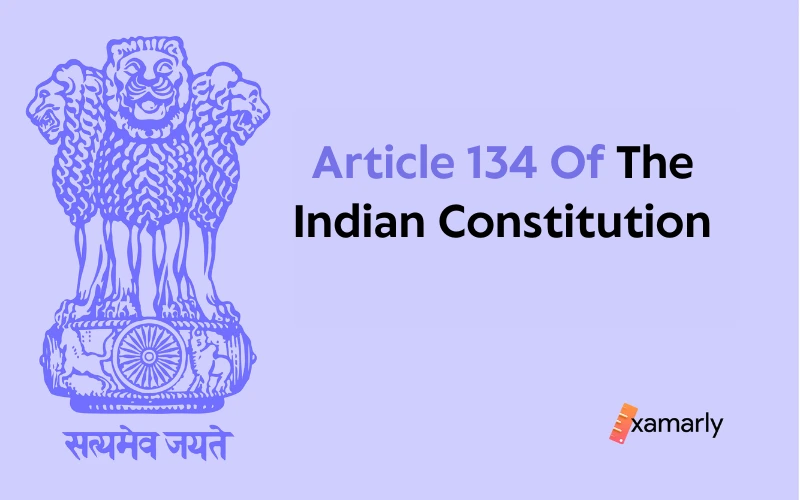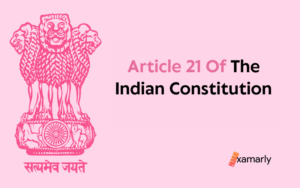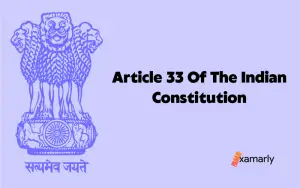The Constitution of India serves as the cornerstone around which the whole Indian legal system is built. It’s the basis for the legal force and efficacy of every other state statute and regulation. The concept of appeals and the appellate jurisdiction of courts originates from the constitution, and both are of utmost importance in India’s system of judicial administration.
With respect to criminal cases, the Supreme Court has appellate authority as stated in the constitutional provisions of Article 134 of the Indian Constitution.
A lower court’s rulings may be subject to review, amendment, or overturning under appellate jurisdiction. This is of utmost importance in legal concerns since it helps to prevent terrible injustices, such as innocent people being found guilty of a crime when they weren’t, or guilty people being absolved of their crimes.
This article will assist you in understanding Article 134.
- What Is Article 134 Of The Indian Constitution?
- Article 134A
- Purpose Of Article 134-A
- Impact Of Amendment
- What High Court Has To Ensure Before Granting Certificate?
- Case Laws
- Sita Ram And Others Vs State Of Uttar Pradesh
- State Bank Of India And Another V. SBI Employees Union And Another
- Conclusion
- FAQs On Article 134
What Is Article 134 Of The Indian Constitution?
The two clauses of Article 134 are mentioned below:
- Any decision made by a High Court in a criminal proceeding on Indian soil, including any final orders or sentences, may be appealed to the Supreme Court if the High Court
- (a) has overturned a decision of acquittal of an accused individual and sentenced him to death;
- (b)has removed any case for trial before itself from any court subordinate to its authority and has found the accused guilty and sentenced him to death; or
- (c) certifies that the case complies with Article 134A and is appropriate for an appeal to the Supreme Court of India:
Provided, however, that an appeal based on subclause (c) shall be admissible subject to such provisions as may be made in that respect under clause (1) of article 145 and to such restrictions as the High Court may establish or necessary.
- Subject to any terms and restrictions that may be established in such a bill, Parliament may by law grant the Supreme Court further authority to entertain and hear appeals from any judgment, final decision, or sentence in a criminal matter of a High Court within the territory of India.
Article 134A
Article 134A of the Constitution of India discusses the certification that is required in order to appeal by law to the Supreme Court.
Every High Court referred to in clause (1) of article 132, clause (1) of article 133, or clause (1) of article 134, pronouncing or making a judgment, decree, final order, or sentence
- (a) may, if it deems it appropriate to do so, on its own motion
- (b) shall, if an oral application is made by or on behalf of the party aggrieved, promptly following the rendering or imposing of such judgment, decree, final order, or sentence,
the question of whether a certificate of the sort referred to in clause (1) of Article 132, clause (1) of Article 133, or, as the case may be, sub-clause (c) of clause (1) of Article 134, may be granted in respect of such case may be determined as soon as may be after such passing or making.
Purpose Of Article 134-A
The new Article 134-A specifies that the HC, either on its own initiative or in response to an oral plea from the aggrieved party immediately following the passing of the judgment, decree, or final decision, may issue a certificate for appeal to the supreme court under the context of Article 132. Before this, the HC could only do this after receiving the application from the party who had been wronged.
Impact Of Amendment
By way of the 44th amendment of the Constitution, Article 134A was added. The Constitution did not previously contain any provision addressing the timing and format of submitting a request for the High Court to grant a certificate under the following Articles:
- Article 132 of the Constitution,
- Article 133 of the Constitution, and
- Article 134 of the Constitution.
What High Court Has To Ensure Before Granting Certificate?
As it aims to simplify how the High Court issues a certificate of appeal to the Supreme Court, Article 134A must be read in conjunction with articles 132, 133, and 134.
According to Article 134A, every High Court that renders a decision under its appellate jurisdiction under Articles 132, 133, and 134 in a civil, criminal, or other case involving “a substantial question of law” regarding the interpretation of the Constitution may decide independently whether to grant a certificate of fitness for appeal to the Supreme Court.
However, if the party that was wronged makes an oral application right away after the judgement, decree, final order, or sentence is passed, it must be done as quickly as possible.
In either scenario, the determination has to be made in a manner that is consistent with the requirements of Articles 132(1), 133(1), and 134. (1). As a result, in order to provide a certificate pursuant to Article 134A, the court must determine that the requirements set forth in Articles 132, 133, and 134 are met.
Case Laws
Sita Ram And Others Vs State Of Uttar Pradesh
The Sessions court had previously declared the appellants in the appeal innocent, but the High Court later found them guilty and sentenced them to life in jail under Section 302 read with 149 of the Indian Penal Code. It was argued that the provision in the Supreme Court (Enlargement of Criminal Appellate Jurisdiction Act of 1970) that allowed the court to dismiss the appeal summarily was outside the bounds of the Enlargement Act when their appeal, filed under that act, was scheduled for its initial hearing.
The second claim was that an appeal under the Enlargement Act could not be abruptly rejected without requesting records or requiring notice to the State, as well as without providing any justification.
Held:
The certificate under Article 134(c) is mentioned as a way to assess how severe a situation is because the High Court that heard the case certifies that it involves important issues that the Supreme Court does not decide on its own.
The first step in resolving such a situation should be to consider whether the High Court can appreciate the gravity of the requirement for such certification to appeal.
State Bank Of India And Another V. SBI Employees Union And Another
The State Bank of India’s employees filed a writ suit with the High Court challenging the management’s authority to set working hours, set aside time for breaks, stagger those breaks, and provide other ancillary reliefs.
In addition to providing permission to initiate an appeal in the Supreme Court to dispute the order of the division bench issuing a certificate in respect of those decisions, the High Court also granted a fitness certificate pursuant to Article 134A of the Constitution.
Conclusion
When discussing the Court’s hierarchy, the Supreme Court is at the very pinnacle. It is basically the Court of Appeals. It is the highest appeals court in the nation. In accordance with Indian Constitutional Articles 132, 133, 134, and 134A, the Supreme Court has appellate powers.
For Further Readings:
FAQs On Article 134
What Does Article 132 Address?
The Indian Constitution’s Article 132 grants the Supreme Court appellate powers over some High Court appeals.
What Does Article 133 Address?
According to Article 133 of the Indian Constitution, the Supreme Court has appellate authority in cases involving appeals from High Courts involving civil affairs.
What Is Article 134 Addresses?
According to Article 134 of the Indian Constitution, the Supreme Court has appellate authority in criminal proceedings.
Which Amendment Has Added Article 134A?
44th amendment has inserted Article 134A into the Constitution. India’s Constitution’s Article 134A addresses the certification for an appeal to the Supreme Court.
What Is The Word “Acquittal” Mean In Context To Article 134?
The term “acquittal” does not necessarily imply that the trial resulted in a complete acquittal; it could alternatively refer to a situation in which a defendant was found not guilty of the murder accusation but found guilty of a lesser offense. According to that interpretation, if the High Court reverses the ruling following an appeal, it equates to reversing an order of acquittal, and the accused is therefore automatically entitled to a certificate under Article 134(1).
What Is The Purpose Of Article 134A?
The intention of Article 134-A is to allow the high court to issue a certificate for the appeal to the supreme court under Article 132 either on its own initiative or in response to an oral request made by the party who was wronged right away after the judgment, decree, or final order was rendered.






